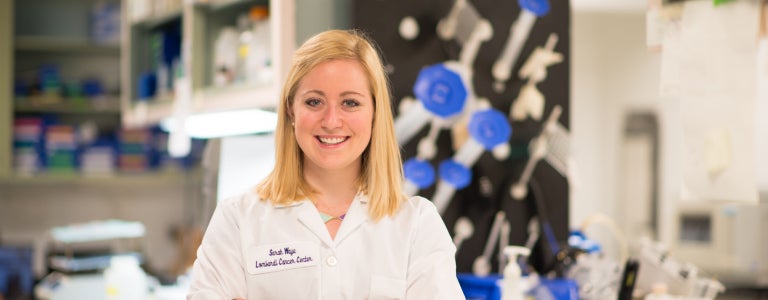Discovering a Career in Science

Neurobiology major Sarah Waye (C’15) won a 2014 Goldwater Scholarship. Photo by Melissa Nyman.
June 2, 2014—Growing up in a small Southern town, Sarah Waye (C’15) received a very different science education from her peers in the Northeast. She was required to study the controversial theory of intelligent design, and teachers taught that evolution was an idea, rather than a fact. So when Waye decided she wanted to deepen her study of biology, she largely had to teach herself.
Waye, a neurobiology major from Marietta, Georgia, took Advanced Placement biology her sophomore year of high school—an ambitious move at a school that lagged behind in science education. Waye and her classmates primarily had to teach themselves the AP curriculum, she says, but that helped provide a richer learning experience. She and her classmates worked together to help each other prepare for the exam.
“Something about biology really seemed to strike me,” Waye said. “And teaching other people about science was something I really liked as well.”
Waye’s determination to succeed in science despite her secondary education drove her to pursue biology at Georgetown. Recently, her efforts were rewarded with a prestigious Goldwater Scholarship, which recognizes undergraduate scientists, engineers, and mathematicians who plan to pursue a career in research upon graduation.
Waye is one of just five undergraduates from her home state to win a Goldwater Scholarship this year. Fellow Georgetown student Kirsten Craddock (C’15), also a neurobiology major, received a 2014 honorable mention.
“Winning the scholarship has really validated all of the time I’ve put into my contribution to the science world,” Waye said. “I think that winning a Goldwater has helped not only to motivate me to continue my research, but also to confirm that I’m on a path that I have a passion and skill for.”
Waye began her path to a career in research during her first year at Georgetown when she became a Howard Hughes research scholar. The program allowed her to work full time in a research lab over the summer. At the time, Waye had never worked in a lab and had done very little research. Still, she made it work.
“I was terrified at first. I hardly knew anything about research. But through that process, I learned how to pick a lab and figure out what I was interested in studying,” Waye said.
After interviewing a number of scientists at Georgetown, Waye chose Christopher Albanese’s lab at the Lombardi Cancer Center. Albanese, an assistant professor in the Department of Oncology at the Georgetown University Medical Center, primarily focuses on the molecular and genetic causes of cancer. Waye says she was inspired by Albanese’s work on cell growth.
“He seemed so passionate about it,” she said. “But I had no idea what I was doing when I went in there.”
Despite her inexperience, Waye had free rein in Albanese’s lab to work with whomever she liked. She would attach herself to various graduate students, and they would let her try whatever techniques and experiments they were working on.
Over the past three years, Waye has transitioned from working on prostate cancer in Albanese’s lab to studying a pediatric brain cancer called medulloblastoma. The tumors associated with this type of cancer are invasive and spread quickly throughout the brain through the cerebrospinal fluid.
While Waye still has another year left before she graduates, she is already thinking about the future. After serving as a teaching assistant for a biology class, it became clear to her that she wanted to both teach and conduct research. Building on the research she has done in Albanese’s lab, Waye is looking ahead to doctoral programs in stem cell and regenerative biology.
“I think that stem cell research is really the key to the future of medicine,” Waye said. “Even in the past several years, there have been amazing advances made that may allow us to grow transplantable organs and save the lives of many people. My specific hope for the future of stem cell research is that it can be used to do what was previously thought impossible, which is to fix the brain and nervous system.”
Whether Waye advances into the field of stem cell research remains to be seen. But the work she’s done at Georgetown in neurobiology has definitely left an indelible impression.
“Not only do I find the complexities and mysteries of the brain really fascinating, but I also think that knowing the brain and neurobiology is one of the keys to increasing the quality of life for many people in a big way,” she said. “To me, that’s what is most important in science.”